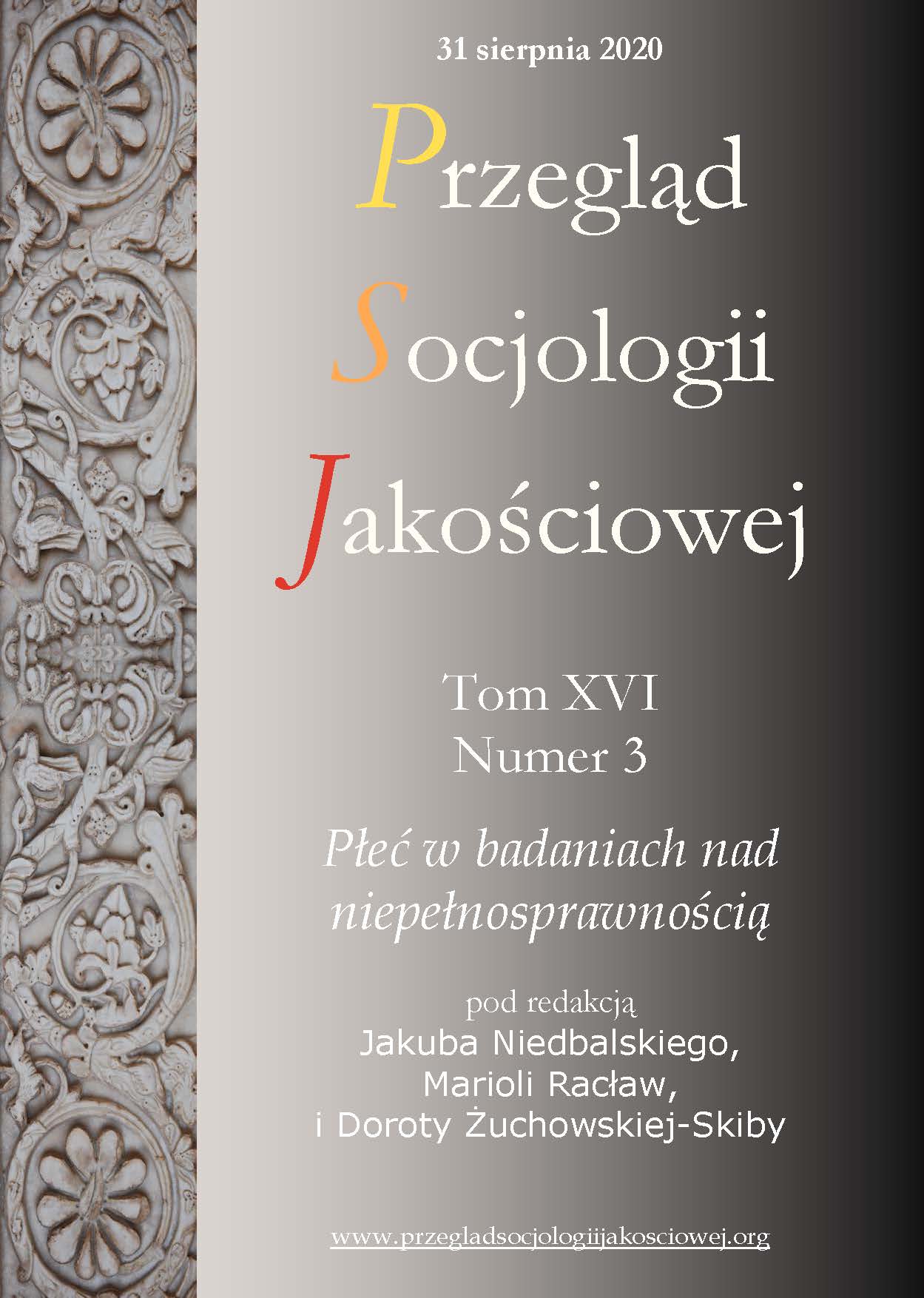Work-Life (Im)Balance? An Explorative Qualitative Study Among Mothers and Fathers of Persons with Disabilities
DOI:
https://doi.org/10.18778/1733-8069.16.3.03Keywords:
disability, parents of persons with disabilities, work-life balance, meaning of work, work valuesAbstract
The aim of this paper is to reconstruct the meaning of professional activity and to present strategies for coping with work-life balance among parents of persons with disabilities. Research proves that having a child with disability very often results in a lower financial status, work overload, and the necessity to manage the child’s rehabilitation. The theoretical context of the study includes Herbert Blumer’s concept of giving meaning to objects as well as Erving Goffman’s notion of stigma by association. The context of the study is illustrated by a brief description of the sit-in protests organized by persons with disabilities and their parents in the Polish Parliament in 2014 and 2018. As such, it refers to the social policy system in Poland. The explorative study was carried out among mothers and fathers of persons with various disabilities in Poland. Individual in-depth interviews were conducted with eight participants. The results show two main types of strategy: working-mode-related and values-related. Both generational and gender differences are present in managing work-life balance.
Downloads
References
Blumer, Herbert. 1969. Symbolic Interactionism: Perspective and Method. Englewood Cliffs: Prentice-Hall.
Google Scholar
Błaszczak, Anna, (ed.). 2015. Realizacja przez Polskę zobowiązań wynikających z Konwencji o prawach osób niepełnosprawnych. Sprawozdanie Rzecznika Praw Obywatelskich. Warsaw: Biuro Rzecznika Praw Obywatelskich.
Google Scholar
Caproni, Paula J. 1997. “Work/Life Balance. You Can’t Get There From Here.” Journal of Applied Behavioral Science 33(1):46-56.
Google Scholar
DOI: https://doi.org/10.1177/0021886397331003
CBOS. 2007. Komunikat z badań „Postawy wobec osób niepełnosprawnych”.
Google Scholar
Frączek, Piotr. 2013. “Rodziny wychowujące dzieci z niepełnosprawnością i ich oczekiwania wobec polityki społecznej.” Wrocławskie Studia Politologiczne 15:46-63.
Google Scholar
Gibbs, Graham. 2007. Analyzing Qualitative Data. London: SAGE Publications.
Google Scholar
DOI: https://doi.org/10.4135/9781849208574
Goffman, Erving. 1963. Stigma. Notes On the Management of Spoiled Identity. New York, London, Toronto: Simon & Schuster.
Google Scholar
Greenhaus, Jeffrey H. and Nicholas J. Beutell. 1985. “Sources of Conflict Between Work and Family Roles.” The Academy of Management Review 10(1):76-88.
Google Scholar
DOI: https://doi.org/10.5465/amr.1985.4277352
Greenhaus, Jeffrey H., Karen M. Collins, and Jason B. Shaw. 2003. “The Relation Between Work-Family Balance and Quality of Life.” Journal of Vocational Behavior 63:510-531.
Google Scholar
DOI: https://doi.org/10.1016/S0001-8791(02)00042-8
Guest Blogger. 2014. “Dancing Backwards and in Heels: Parenting a Special Needs Child.” Think Inclusive (March 28). Retrieved March 21, 2020 https://www.thinkinclusive.us/dancing-back-wards-and-in-heels-parenting-a-special-needs-child/
Google Scholar
Higgins, Chris A., Linda E. Duxbury, and Sean T. Lyons. 2010. “Coping with Overload and Stress: Men and Women in Dual-Earner Families.” Journal of Marriage and Family 72(4):847-859.
Google Scholar
DOI: https://doi.org/10.1111/j.1741-3737.2010.00734.x
Kołodziejczyk-Olszak, Izabela and Anna Rogozińska-Pawełczyk. 2008. “Miejsce oceny i wynagradzania efektów pracy jako obszar programów praca-życie.” Pp. 161-171 in Równowaga. Praca-Życie-Rodzina, edited by C. Sadowska-Snarska. Białystok: Wydawnictwo Wyższej Szkoły Ekonomicznej w Białymstoku.
Google Scholar
Kubicki, Paweł. 2017. Polityka publiczna wobec osób z niepełnosprawnościami. Warsaw: Oficyna Wydawnicza SGH.
Google Scholar
Kubicki, Paweł, Rafał Bakalarczyk, and Marek Mackiewicz-Ziccardi. 2019. “Protests of People with Disabilities as Examples of Fledgling Disability Activism in Poland.” Canadian Journal of Disability Studies 8(5). Retrieved March 21, 2020 https://cjds.uwaterloo.ca/index.php/cjds/article/view/569
Google Scholar
DOI: https://doi.org/10.15353/cjds.v8i5.569
Lachowska, Bogusława. 2012. Praca i rodzina – konflikt czy synergia? Lublin: Wydawnictwo KUL.
Google Scholar
Laksa, Kobas. 2017. “Nie czuję, żebym się różnił od matki.” Pp. 94-113 in Lista Obecności 2017. Rozmowy z ojcami niepełnosprawnych dzieci, edited by E. Zakrzewska-Manterys and A. Suchcicki. Warsaw: Bardziej Kochani.
Google Scholar
Liamputtong, Pranee. 2007. Researching the Vulnerable: A Guide to Sensitive Research Methods. London: Sage Publications.
Google Scholar
DOI: https://doi.org/10.4135/9781849209861
Licznerska, Agnieszka Lena. 2016. “Disability and Ethics: A Parent Action in Poland.” Forum Oświatowe 28(2):49-64. Retrieved January 28, 2018 http://forumoswiatowe.pl/index.php/czasopismo/article/view/463
Google Scholar
Lipińska-Grobelny, Agnieszka. 2014. “Wielość ról a równowaga między życiem osobistym i zawodowym.” Pp. 14-27 in Rodzina i kariera. Równoważenie czy konflikt ról?, edited by I. Janicka and M. Znajmiecka-Sikora. Lodz: Wydawnictwo Uniwersytetu Łódzkiego.
Google Scholar
Ostrowska, Antonina. 2015. Niepełnosprawni w społeczeństwie 1993-2013. Warsaw: Wydawnictwo Instytutu Filozofii i Socjologii PAN.
Google Scholar
Rostowska, Teresa. 2009. Małżeństwo, rodzina, praca a jakość życia. Cracow: Oficyna Wydawnicza Impuls.
Google Scholar
Sałkowska, Marta. 2015. Matka Downa. Piętno. Znaczenia. Strategie. Cracow: Zakład Wydawniczy NOMOS.
Google Scholar
Sałkowska, Marta. 2018. “Sejmowe protesty opiekunów osób z niepełnosprawnościami – wybrane wątki analityczne artykułów prasowych.” Societas/Communitas 2-2(26-2):233-246.
Google Scholar
Schwandt, Thomas A. 1998. “Constructivist, Interpretivist Approaches to Human Inquiry.” Pp. 221-259 in The Landscape of Qualitative Research: Theories and Issues, edited by N. K. Denzin and Y. S. Lincoln. Thousand Oaks, London, New Delhi: SAGE Publications.
Google Scholar
Sousa, Amy C. 2011. “From Refrigerator Mothers to Warrior-Heroes: The Cultural Identity Transformation of Mothers Raising Children with Intellectual Disabilities.” Symbolic Interaction 32(2):220-243.
Google Scholar
DOI: https://doi.org/10.1525/si.2011.34.2.220
Stelter, Żaneta. 2013. Pełnienie ról rodzicielskich wobec dziecka niepełnosprawnego intelektualnie. Warsaw: Difin.
Google Scholar
Thoits, Peggy A. 2011. “Resisting the Stigma of Mental Illness.” Social Psychology Quarterly 74(1):6-28.
Google Scholar
DOI: https://doi.org/10.1177/0190272511398019
Zakrzewska-Manterys, Elżbieta and Andrzej Suchcicki, (eds). 2017. Lista Obecności 2017. Rozmowy z ojcami niepełnosprawnych dzieci. Warszawa: Bardziej Kochani.
Google Scholar
Downloads
Published
How to Cite
Issue
Section
License

This work is licensed under a Creative Commons Attribution-NonCommercial-NoDerivatives 4.0 International License.














